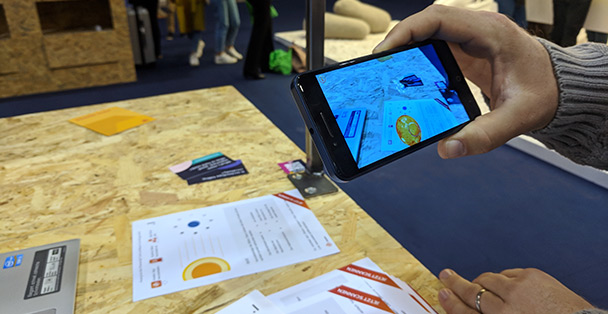Over three and a half days last week in Lisbon, Portugal, 81,000 attendees, speakers, journalists, and volunteers gathered to discuss the future of technology at Web Summit 2017. While the conference wasn’t specifically geared to explore learning and development, understanding how technology shapes our daily lives helps us understand how we can use technology to help support learning.
Opening night kicked off with a surprise keynote by the legendary physicist Stephen Hawking, who called for a responsible approach to technological development with creation of a European regulatory committee to help develop a code of ethics around artificial intelligence and responsible development. Margrethe Vestager, European commissioner for competition; António Guterres, secretary-general of the United Nations; and António Costa, prime minister of Portugal, echoed the same sentiment, in addition to creating checks and balances to ensure fair competition and using technology to combat future worldwide crises like climate change and growing inequality. Al Gore, former vice president of the United States, closed the conference with a rousing call to action to push forward efforts in addressing climate change using technological innovations.
Over 2,100 startups pitched their products and ideas to a community of investors. Some of them in the education and workforce development space were:
- teambay: Based in Berlin, Germany, teambay’s HR solution creates a continuous internal dialogue and analyzes anonymous employee feedback, with promises to boost company productivity. Employees are given weekly bite-sized questions about various aspects of their workplace. The simplicity of the questions, and the anonymity, allows management to get vital, honest feedback to create a better workplace culture. teambay currently focuses its product on companies with 200 – 5,000 employees.
- Devscore: Based out of the United Kingdom, Devscore utilizes an API with GitHub, pairing it with machine learning to validate developer code. Each developer is given a score based on factors such as the complexity of their code, syntax adherence, and functionality—which assists recruiters and companies in getting quality engineers. Future expansion will create a community for beginners to develop their coding careers and build their scores through curated courses online.
- Eurekos: Based in Nivå, Denmark, Eurekos has developed what it calls the “Next Generation Digital Learning Environment” to replace the LMS. The company initially began in the enterprise space and eventually partnered with a large university in Holland to develop 4,000 courses over the span of two and a half years, with teachers creating their own courses in the system. With 100,000 users, Eurekos’s system has integrated xAPI and cmi5 standards with a special focus on using social networking within each module.
- Areeka: Based in Vienna, Austria, Amlogy has created the Areeka mobile app using AR with schoolbooks, bringing sustainable, faster, and more fun learning to schools. The founders, who are both refugees, found when they immigrated to a new country that they had difficulty with the language in school. Recognizing that more interactive, visual 3-D models can assist in learning, they work with book publishers and the educational ministries in various European countries to develop illustrations.

Figure 1: Demonstration of Areeka
In addition to the startups looking to improve and change the current education and workplace development landscape, presenters at the Web Summit previewed what the future could look like with technology leading the way. Uber Elevate will be doing test flights in urban air transportation to move ride-sharing into the skies; Kernal wants to put a chip in the human brain to improve neurodegenerative disease and cognition; and the future of marketing will combine analysis of social media accounts with machine learning and artificial intelligence to personalize advertising directly to individual consumers. Technology is moving at an incredible speed, and it’s only a matter of time before companies like Kernal and technologies like artificial intelligence will change the entire landscape of learning.


